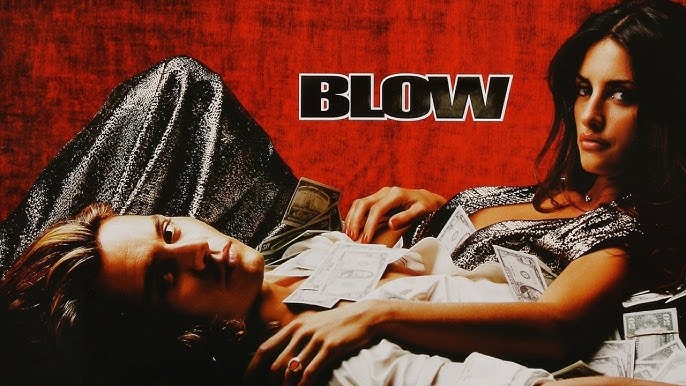Blow (2001)

“Blow,” directed by Ted Demme and released in 2001, is a compelling biographical crime drama that chronicles the rise and fall of one of America’s most notorious drug traffickers, George Jung, portrayed by Johnny Depp. The film is based on Jung’s life and offers a gritty, unflinching look at the world of drug smuggling in the 1970s and 1980s, exploring themes of ambition, betrayal, and the cost of the American Dream.
“Blow” begins by introducing George Jung as a young man in the suburbs of Boston, growing up in a tumultuous household. The film portrays his strained relationship with his father (Ray Liotta), who struggles to provide for the family, and his mother (Rachel Griffiths), who seeks stability through her marriage. These early experiences shape George’s aspirations, driving him to seek financial success and social acceptance.
As a young adult, George moves to California, where he quickly becomes involved in the burgeoning marijuana trade. His charisma and ambition allow him to thrive in this new environment, and he soon partners with a Mexican drug lord, establishing connections that would lead him to become a significant player in the cocaine market. The film effectively captures the allure of wealth and the excitement of a fast-paced lifestyle, highlighting the intoxicating nature of power and the thrill of illegal activities.
Johnny Depp delivers a standout performance as George Jung, masterfully embodying the character’s charm, vulnerability, and ultimate downfall. Depp’s portrayal captures the complexities of Jung’s personality, making him both relatable and tragic. As George ascends the ranks of the drug trade, his character undergoes significant transformation, revealing the internal struggles that come with his criminal lifestyle.
The supporting cast also contributes to the film’s depth. Penélope Cruz plays Mirtha, George’s love interest, whose relationship with him illustrates the personal sacrifices and emotional turmoil that accompany his life choices. Their passionate but tumultuous romance underscores the theme of love versus ambition, as George grapples with the consequences of his actions on those he cares about.

At its core, “Blow” is a cautionary tale about the pursuit of the American Dream and the inherent dangers that lie within it. The film explores the idea that ambition can lead to success but also to moral decay and destruction. George’s relentless quest for wealth blinds him to the consequences of his actions, ultimately leading to his downfall.
Betrayal is another central theme that permeates the narrative. As George navigates the treacherous waters of the drug trade, he faces numerous betrayals from friends and associates, reflecting the ruthless nature of the world he inhabits. This sense of betrayal culminates in George’s relationships, particularly with Mirtha and his family, as the choices he makes fracture the bonds that once held them together.

Ted Demme’s direction in “Blow” is both stylish and impactful. The film employs vibrant cinematography that captures the glamor and excess of the drug culture while simultaneously portraying the darker aspects of addiction and violence. The use of contrasting visual styles—bright and colorful scenes of George’s highs juxtaposed with the grim realities of his lows—reinforces the duality of his existence.
The film’s pacing is well-executed, balancing moments of tension with introspective scenes that allow viewers to connect with George’s emotional journey. Demme skillfully weaves together elements of humor and tragedy, creating a narrative that is both entertaining and thought-provoking.

The soundtrack of “Blow” also plays a crucial role in establishing the film’s tone and enhancing the viewer’s experience. Featuring an eclectic mix of classic rock and contemporary tracks, the music reflects the era and adds emotional resonance to key scenes. The songs serve to underscore George’s journey, marking significant moments in his life with a nostalgic and poignant soundtrack.
Upon its release, “Blow” received generally positive reviews from critics and audiences alike. Many praised Depp’s performance and the film’s honest portrayal of the drug trade. However, some critics noted that the film occasionally romanticizes the lifestyle of drug dealers, potentially overshadowing the real-life consequences of their actions. Despite these criticisms, “Blow” has since garnered a cult following and is often regarded as a significant entry in the crime drama genre.

In conclusion, “Blow” is a powerful exploration of the life of George Jung, providing a gripping and unvarnished look at the world of drug trafficking. Through its strong performances, particularly from Johnny Depp, and its exploration of themes such as ambition, betrayal, and the cost of the American Dream, the film resonates on multiple levels. Ted Demme’s direction, combined with a compelling script and an evocative soundtrack, creates a cinematic experience that lingers in the mind long after the credits roll. “Blow” serves as both an entertaining crime drama and a cautionary tale about the perils of unchecked ambition and the fleeting nature of success in the high-stakes world of drug trafficking.
Suggested videos for you:
The Assassin’s Edge: A Kill with a Single Page
Suggested videos for you:
When Russia Goes All Out: Launching a Full Barrage of Hypersonic Missiles at the U.S
Suggested videos for you:











